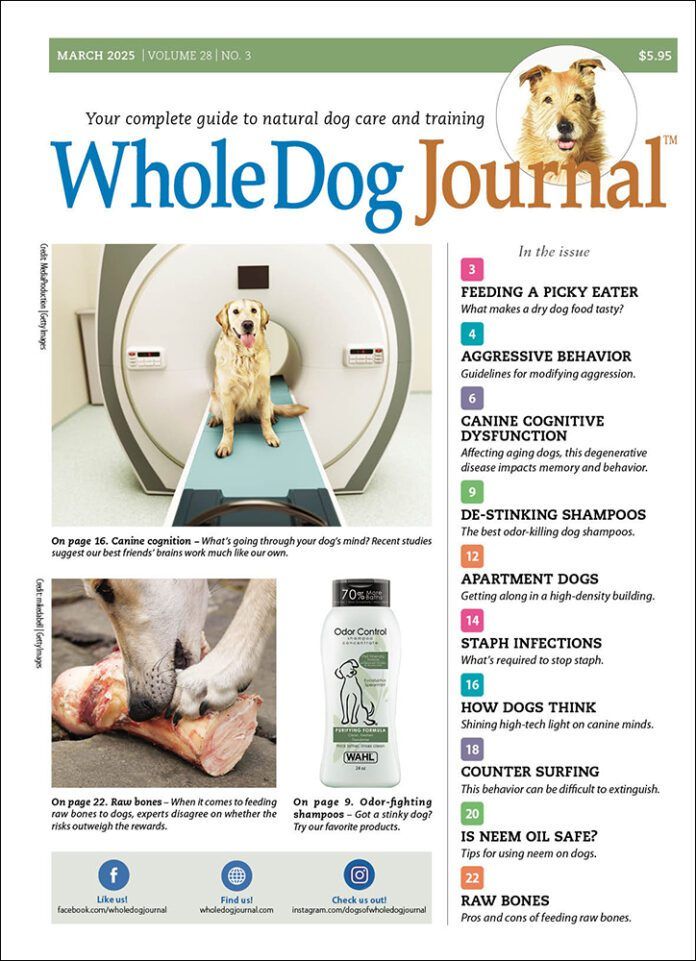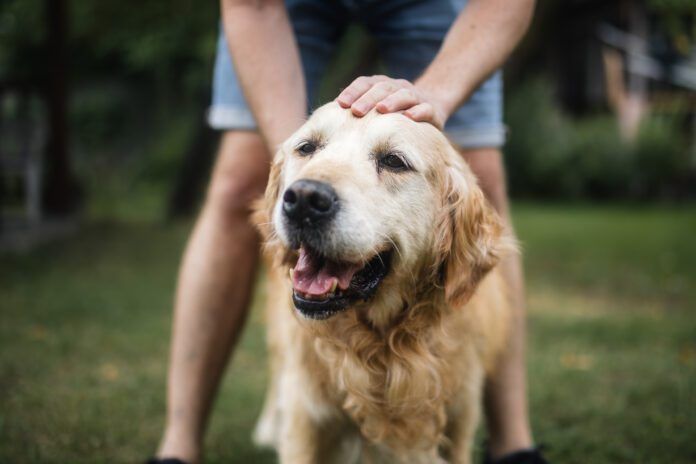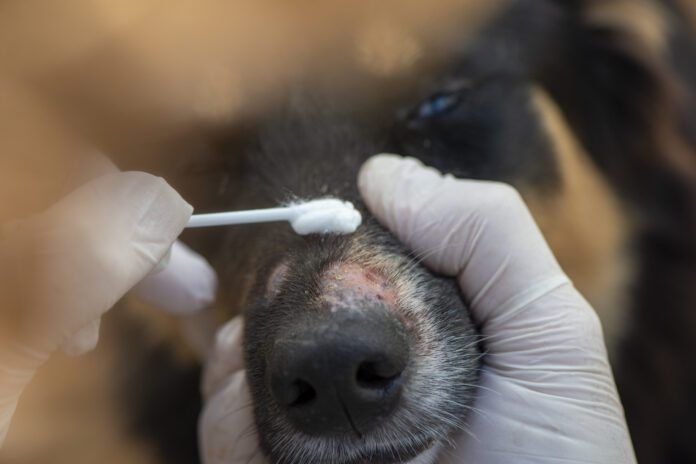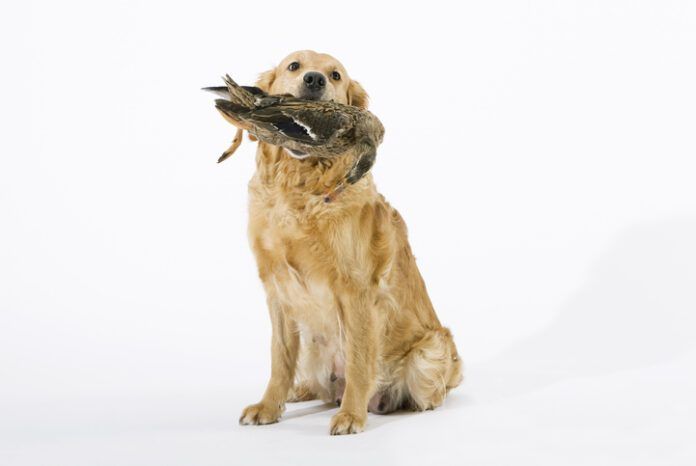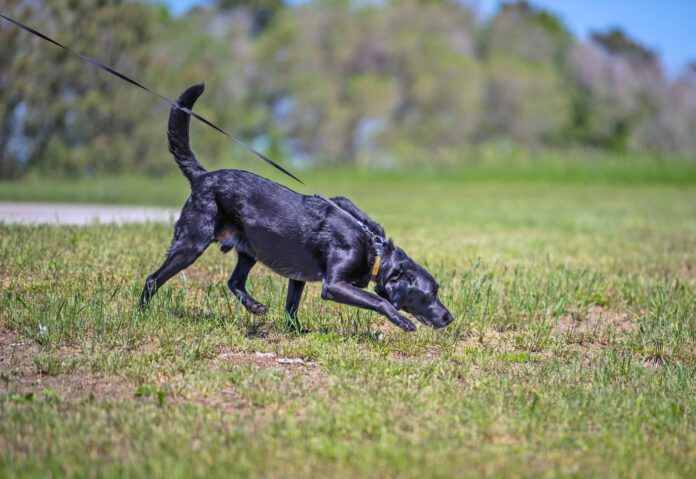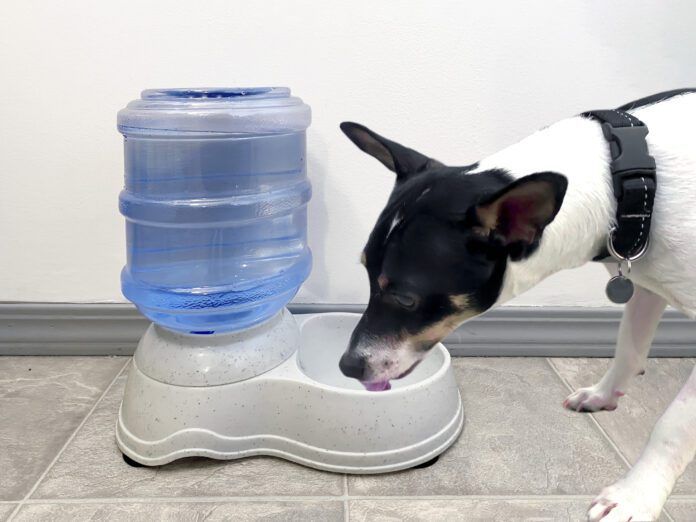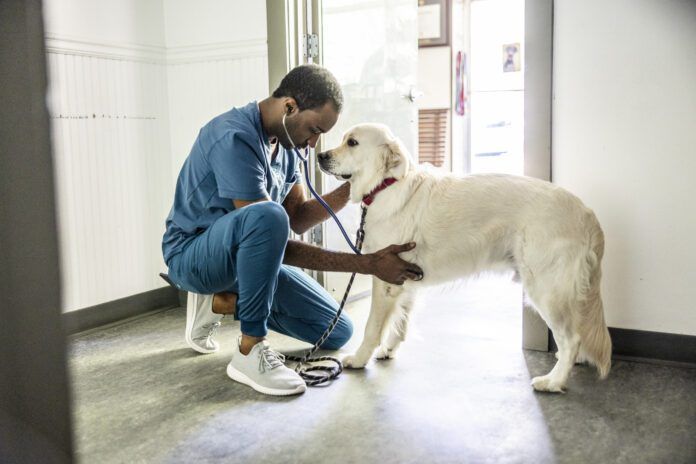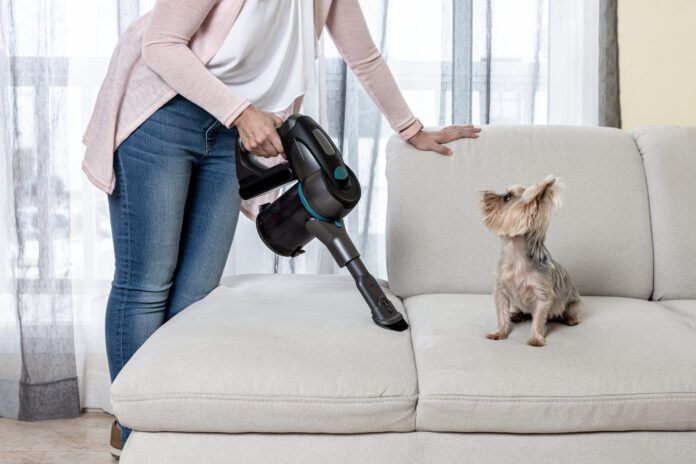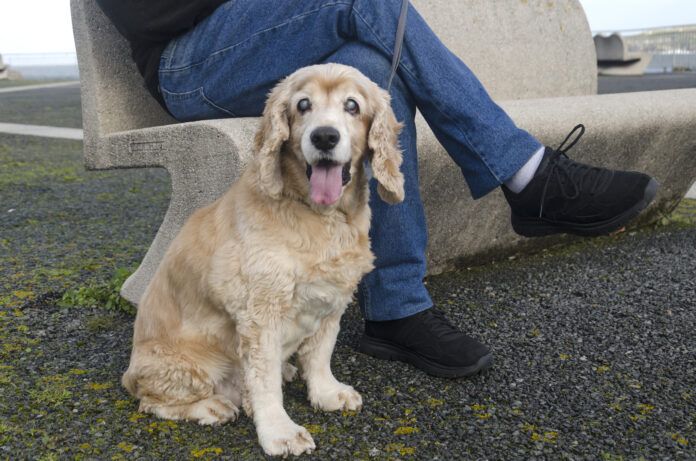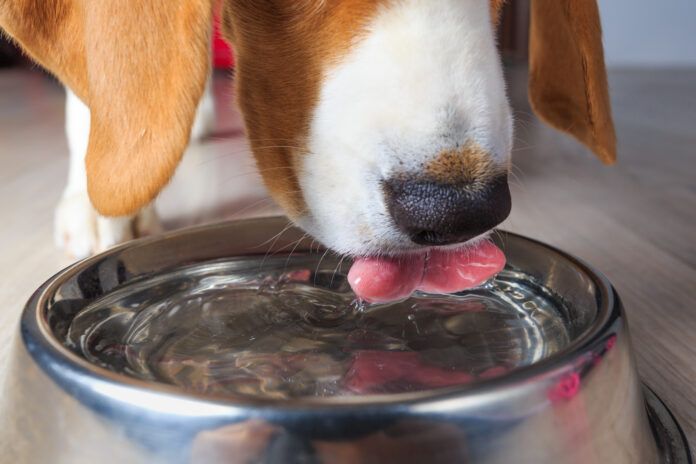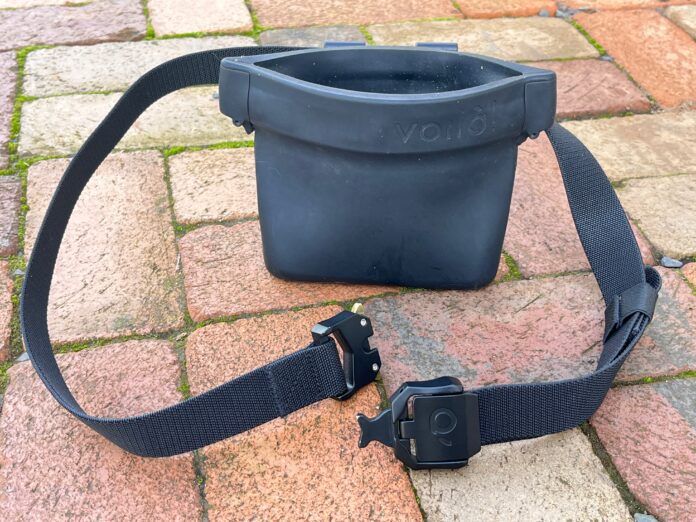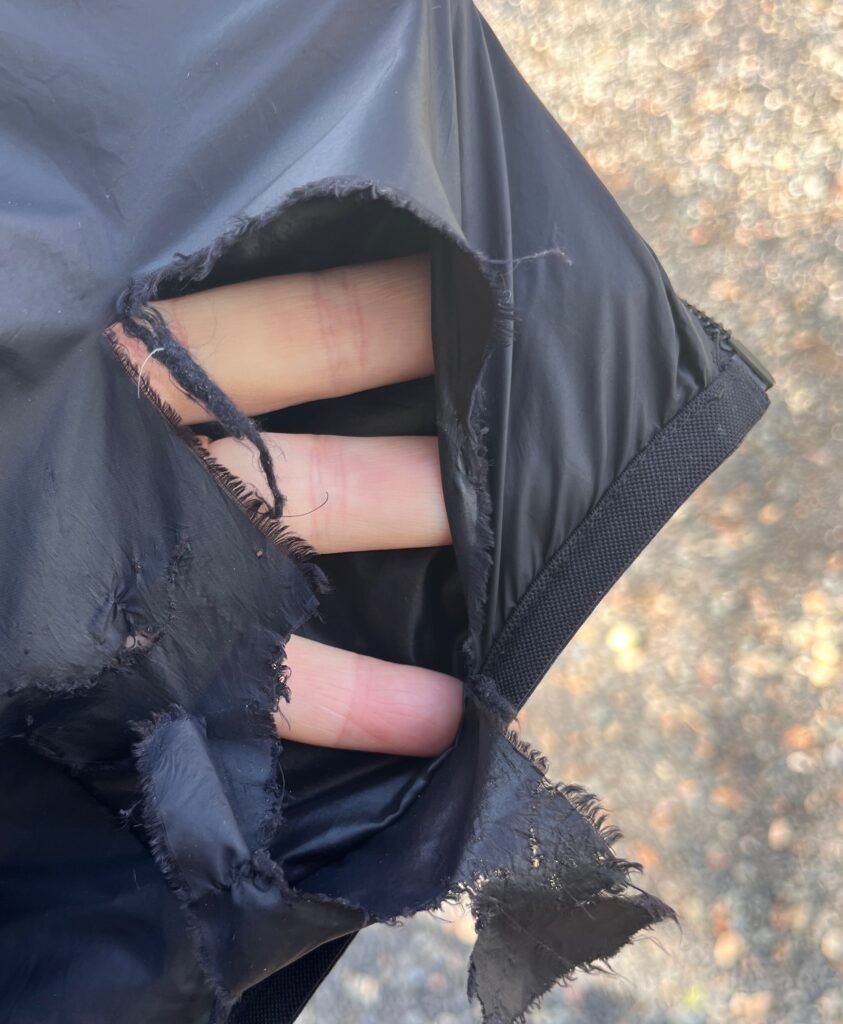Water is necessary for all body functions, everything from regulating temperature to lubricating internal organs and joints, eliminating waste from the body, moisturizing air in the lungs, transporting oxygen to cells, maintaining a healthy skin and coat, and supporting the nervous system.
Pet water fountains offer a steady supply of fresh water and encourage drinking by attracting a dog’s attention with their sights and sounds. Some fountains filter impurities, and constantly circulating water maintains a cool temperature, which dogs enjoy. Fountains are convenient for dog owners, too, because they don’t require the frequent refilling that water bowls do.
How Much Water Should a Dog Drink Per Day?
A ratio of 1 ounce of water per pound is a sensible starting place for daily dog hydration, and more may be needed for active dogs, lactating dogs, dogs who spend time outdoors in hot weather, and dogs eating a dry (kibble) diet. To convert your dog’s weight to cups of water, divide her weight in pounds by 8 (there are 8 ounces in a cup). For example, a 40-pound dog needs at least 40 ounces (5 cups) of water daily.
Typically made of stainless steel, plastic, or ceramic materials, dog water fountains can be:
- Gravity powered
- Electric (with a cord that plugs into the wall)
- Battery operated (wireless)
- Powered by a garden hose
Pet water fountains are designed for indoor or outdoor use and come in different sizes to accommodate multiple pets and dogs of all sizes.
What Are the Simplest Dog Water Fountains?
The simplest and least expensive water fountains for dogs are fed by gravity. A reservoir is attached to a watering bowl, and as the dog removes water from the bowl, gravity refills it. The more often a dog drinks from the fountain, the faster its water is replaced.
PetSafe’s Healthy Pet Water Station comes in three sizes, small (1/2 gallon, $19.95), medium (1 gallon, $24.95), and large (2.5 gallons, $49.95). For a 10-pound cat or dog, the small size needs refilling every 6 days; for a 50-pound dog, the medium size needs refilling every other day; and for a 100-pound dog, the large size needs refilling every two days. These fountains are for indoor use and are made of BPA-free plastic. Carbon filters, sold separately, are an optional accessory.
Richell’s Elevated Gravity Water Dispenser for Dogs and Cats ($50) comes in one size (1 gallon), is for indoor use, is made of durable plastic, has a wide lid design, and is dishwasher-safe.
Hanamya’s Automatic Pet Water Dispenser ($30) comes in one size (3 liters, or 3/4 of a gallon), is for indoor use, and is made of polypropylene (plastic).
The Ruff Land Water Hole ($48.99) is a portable water jug/water dish that holds up to 1 gallon. Intended for outdoor use, the container, which is made with material recycled from the manufacturing of Ruff Land kennels, is designed to neither crack nor break if it freezes.
How to Transition Your Dog to a Dog Water Fountain
To help your dog become used to a pet water fountain, experts recommend:
- If your dog is used to stainless steel food and water bowls, try a fountain with a stainless steel reservoir.
- Position the fountain in a familiar area far from doors and foot traffic but near a sink faucet for convenient refilling.
- Place a familiar water bowl next to the fountain to help with the introduction.
- Let your dog become used to the fountain before filling it with water. Be patient and let your dog explore the fountain in his own way.
- Say the word “drink” or “water” whenever your dog drinks from her water bowl, then later use that instruction to encourage her to drink from the fountain.
Garden Hose Dog Water Fountains
Water pressure from your house, garage, or barn powers these fountains, which hold large quantities of water and are typically easy to maintain.
The Easy-Clean Water Bowl ($34.95) comes with a 10-foot exterior hose and is designed for use outdoors with dogs, horses, or livestock. It fills automatically with a quiet fast-fill float valve and holds 32 ounces. Optional accessories include a 12-foot heat cable to prevent freezing in cold weather.
The Bear Bear Sir Aqua II Automatic Float Waterer ($32.99) attaches to an outdoor hose and holds1.8 gallons of water in its stainless steel reservoir, which refills as water is consumed. A high-density polypropylene cover protects the valve and float mechanism.
Cowboy’s Self-Cleaning Waterer ($44.99) attaches to a garden hose and, when you open the faucet, flushes debris as it replenishes water in its 20-quart pail. Designed for outdoor use, it reduces algae, mosquito larva, and stagnant water. An optional automatic timer, purchased separately, fills and flushes the bucket at chosen intervals. This waterer works best with medium- and large-breed dogs as well as horses and livestock.
If your dog loves to play with your garden hose, he’ll enjoy the Pet Fit for Life Step-Activated Dog Water Sprinkler ($44.95). This fountain attaches to your hose and all your dog has to do is step on it to produce a vertical stream that’s fun to drink and run through. The sprinkler comes with a hose splitter so you can water your garden while your dog plays.
Electric Dog Fountains
The OneIsAll Large Dog Water Fountain ($69.99), made of stainless steel, holds 7 liters of water, comes with a 1.5-meter power cord, and displays its reservoir’s water level through a built-in window. Water constantly circulates through a quiet elevated faucet and a red light indicates when the reservoir level is low. This indoor fountain uses carbon filters to keep water clean.
The Pioneer Pet Big Max Stainless Steel Drinking Fountain ($99.99) uses replaceable charcoal filters to keep 1 gallon of water ready for use. Easy to clean and dishwasher safe, its extra-large drinking area accommodates dogs of all sizes and it has an adjustable flow switch. This fountain’s electric cord is just under 6 feet long. See also Pioneer’s Durable Ceramic Big Max Fountain (on sale this month for $49.99), which also holds 1 gallon of water.
The stainless steel Mailofy Dog Water Fountain ($69.99) holds 11 liters (2.75 gallons) of water cleaned by a 4-layer filtration system, enough to last a large dog 7 to 10 days. Easy to clean and assemble, the unit’s round window shows its reservoir level and an indicator light comes on when the unit needs refilling. This fountain’s low-noise electric motor is designed for indoor use.
PetLibro’s corded electric Capsule Dog Fountain ($59.99) uses five layers of filtration to fill its 2-gallon water tank. Recommended for medium- to large-size dogs and for indoor use, the Capsule is made of ABS thermoplastic polymer.
Cordless Battery-operated Dog Water Fountains
Recommended for cats and small dogs, the PETKIT Eversweet 3 Water Fountain ($79.99) combines ultraviolet-light sterilization, three modes of water flow, stainless steel construction, 4 layers of filtration, and a Bluetooth app to remind you when to refill the container or change its filter. The system holds 1.35 liters of water and keeps 60 milliliters (2 fluid ounces) in its water tray.
The DH025 Cordless Battery Operated Pet Water Fountain ($43.37) from Dog H2O provides over 3 quarts of regularly filtered and aerated water. Made of food-grade and BPA-free materials, this fountain is powered by 4 size “D” batteries and is designed for indoor and outdoor use. For maintenance, empty and clean the fountain every 2 to 3 days, especially if outdoors. The fountain is made of polypropylene.
The APETDOLA Wireless Dog Water Fountain ($49.99) uses a built-in rechargeable battery that runs for 2 to 4 weeks and provides 1.8 gallons of automatically filtered water. Made of ABS thermoplastic polymer, the system is made to be easy to disassemble and clean. For maintenance, clean weekly and replace the filter as needed, every 2 to 4 weeks.
Is It Worth Getting a Dog Water Fountain?
Pet water fountains are convenient, but they can have drawbacks.
On the plus side, dog water fountains:
- Provide fresh, clean water
- Encourage pets to drink and avoid dehydration
- Are convenient for pets and people
- Reduce odors by preventing the accumulation of bacteria
- Are usually easy to clean and disinfect
The main drawbacks of dog water fountains are:
- They can be noisy enough to bother sound-sensitive dogs.
- Most pet water fountains require more maintenance and cleaning than a simple water bowl does. Several brands recommend changing filters every 2 to 4 weeks and disassembling and cleaning the pump every month.
- Pet water fountains can be expensive, and fountains that use replaceable filters have added costs.
- Water in fountains that do not constantly recycle water can become stagnant and collect hair or dirt, even when filtered.
- Electric pet fountains must be near a power outlet and will stop working in a power outage, and battery-operated fountains require regular recharging or battery replacement so they don’t stop working.
- When pet fountain pumps malfunction, they have to be replaced.
- It’s hard to determine how much water a dog has consumed from a fountain, which makes monitoring water intake for health reasons difficult.
Some pet water fountains are substantially larger than a simple water bowl, so positioning the fountain may be difficult in small or multiple-pet households


